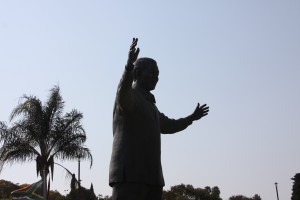There’s a saying I often use in churches: don’t check your brain at the door. It’s an encouragement to be engaged, to be thoughtful, to question, to listen carefully, to assess continually what may be true or untrue, to engage critically and constructively.
It’s an encouragement to assume what in theological circles, specifically Biblical studies, is termed a hermeneutics of suspicion.
Hermeneutics relates to interpretation–interpreting the meaning of a text, for example, by taking into account its context, authorship, wording and the likes. Suspicion in the sense I’m using it is not the radical suspicion that had its genesis in Nietzsche, but rather a gentler way of reconciling what a person or text is relating with the ethical imperative to apply reason to it.
Yes, I said ethical imperative to apply reason.
During my formative years in a deeply religious home in apartheid-era South Africa, questioning was welcome to a point though not encouraged especially when it meant challenging accepted authority. The authority of the primary religious texts of the tradition in which I was raised was off limits. The authority of the state was off limits. Romans 13:1-6, which encourages obeisance to the ruling authorities, had much to do with this in spite of its greater context in Paul’s discourse about love.
While this did not prevent me from applying reason and critical thinking, it collapsed the horizon of possible deductions and conclusions. Ironically, the primary religious texts led me to question aspects of the political reality.
For example, I often wondered why if God created human beings in God’s image and likeness and pronounced all creation very good, how was the reality of racism permissible since it undermined the value of God’s image and likeness in some? And since the author, a woman, of one of the authoritative texts proclaimed liberation for the oppressed in body, mind, and spirit, how could the government’s and society’s racism and patriarchy hold muster?
There wasn’t much impetus to question in the Christian nationalist education I was exposed to in school either, except in a history class where Mr. Welsh intentionally exposed us over the course of my last three years of high school to historiography and different ways of interpreting events and writing history. He instilled in me the basic building blocks of a hermeneutics of suspicion.
Attending a liberal arts college in the US vastly expanded this hermeneutics and laid the foundation for the ethical imperative to thoughtfully engage, question, listen and read critically, and assess continually the nuances of truth and falsehood, of that which is salubrious or deleterious. Far from a mere deconstructionist approach, my intention and practice became to apply this ethical reasoning to building up and reconstructing intersubjective relations in ways that can lead to social and political reconciliation and peaceableness. I applied this as a journalist to great effect.
In the intervening years, largely thanks to the work of Emmanuel Katongole, the hermeneutics of suspicion I have adopted in my theological and peacebuilding work starts from a simple question: what good is here? It’s not a denial of the trauma, hurt, or even evil that exists or a cheap optimistic bent. Rather, it is a way of orienting myself toward horizons of possibility as I apply reason and critique to all facets of being. It is the epistemological cornerstone on which of an ontology of hope is being constructed.
The ethical imperative to apply reason is all too often diluted by convenient and self-aggrandizing ideologies and the sloppy thought processes they rely on. Checking one’s brain at the door, so to speak, is a way of undermining the good that may be gained through critically constructive engagement through the application of reason and critical thinking.

